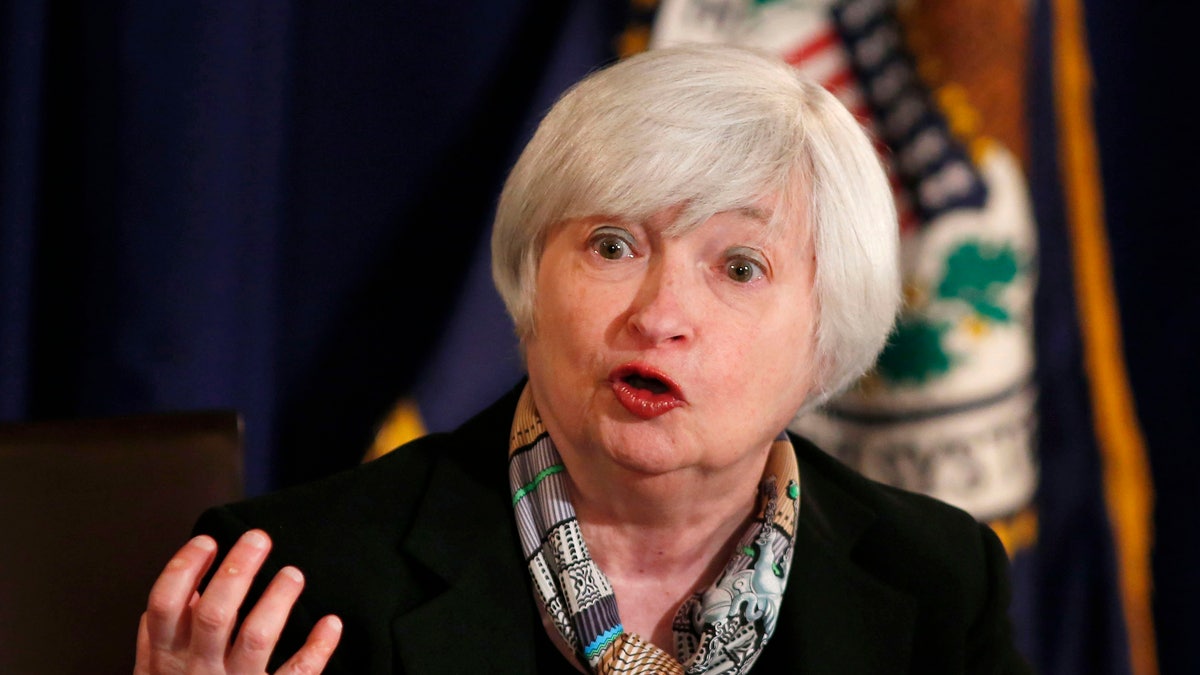
Federal Reserve Chair Janet Yellen talks at a news conference following the March 2014 Federal Open Market Committee meeting while at the Board of Governors of the Federal Reserve Sysytem in Washington, March 19, 2014. (REUTERS/Larry Downing)
When the Treasury Department announced in February that the $680 billion federal deficit for the 2013 fiscal year is the smallest our country has seen since 2008, the Obama administration widely touted the news as proof that the president’s economic policies are working.
Treasury Secretary Jack Lew said at the time, “We are moving in the right direction… our deficit today is less than half of what it was when President Obama first took office.”
Many Democrats in Congress used the news to call for another stimulus package and more deficit spending.
[pullquote]
Putting aside how anyone could celebrate the fact that our federal government ran $680 billion in the red last year, recent testimony from Federal Reserve Chairwoman Janet Yellen should permanently throw cold water on plans for any new unpaid for spending.
During her appearance before the Joint Economic Committee last week, I asked Yellen how Congress can help business owners in Indiana and across the country with the uncertainty they face in this economy.
Her answer highlighted why the long-term deficits Washington currently is projected to run must be addressed.
“There is more work to do to put fiscal policy on a sustainable course,” Yellen said. “That progress has been made over the last several years, in bringing down deficits in the short term, but that a combination of demographics, the structure of entitlement programs, and historic trends in health-care costs, we can see that over the long-term deficits will rise to unsustainable levels relative to the economy.”
What specifically was she referencing?
According to the non-partisan Congressional Budget Office (CBO), the gross federal debt will continue to rise rapidly over the next decade, peaking at 101 percent of gross domestic product by 2024. CBO projects that gross federal debt will increase from $16 trillion last year to $27 trillion in 2024. During this same time, net interest expense nearly quadruples – from $221 billion to $876 billion.
With these comments, the Fed Chairwoman joined a long list of academics, economists, business leaders and even the bipartisan Simpson-Bowles Commission who have all stated the obvious: Unless the United States makes tough spending choices in the short-term, eventually we are going to face a debt-induced catastrophe. It is only a matter of time, and the clock is running down.
In fact, if interest rates were not artificially held down by the Fed at historically low levels, we might already be facing our day of reckoning. According to CBO, even a one percentage point increase in interest rates would add $1.1 trillion to the United States’ debt over 10 years. And that new debt would occur without any changes in spending or taxing — interest rates alone would simply drive our debt out of control.
Our economy is like a leaking ship being plugged with a few sticks of gum. Congress and the White House must act if we want to avoid the same fate as the Titanic.
Just this week, a new poll found that 91 percent of Americans agree that a stable fiscal foundation will help the economy grow.
I believe the American people will rally around elected officials if we demonstrate that we are willing to make tough fiscal choices to stabilize the nation’s long-term financial future.
Congress and the administration must heed the warnings of Yellen and others and summon the political will to take the tough medicine, now, that will heal this economy.
